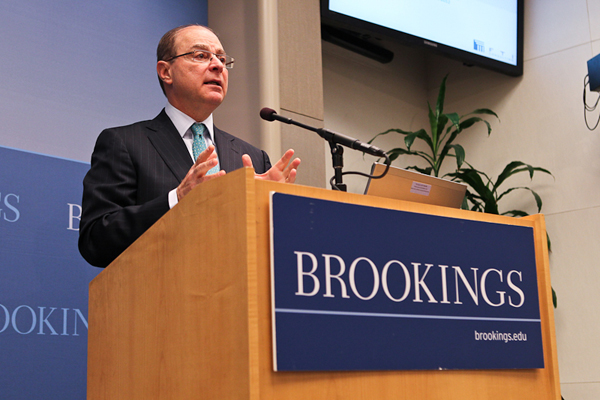Americans believe higher education must innovate

Although a majority of Americans believes higher education remains critical to the nation’s competitiveness and the best way for individuals to achieve the American Dream, 83 percent say that higher education must innovate for the United States to maintain its global leadership, according to a new Northeastern University survey.
The national opinion poll, conducted for Northeastern by FTI Consulting, underscores the centrality of higher education to the country’s competitiveness and character, but also illustrates the belief of most Americans — particularly those under 30 — that the world’s preeminent higher education system must change.
“These results show that while Americans are very proud of our higher education system, they’re also concerned about the future,” said Northeastern President Joseph E. Aoun. “In overwhelming numbers, they’re telling us that the system of today will not meet the challenges of tomorrow. These findings are a wake-up call for those of us in higher education to renew the social compact we have always had with Americans by innovating across multiple dimensions.”
According to the survey, seven in 10 Americans believe higher education is “extremely” or “very important” to achieving the American Dream. Among those who have attended college, 83 percent consider college a good investment. In addition, most Americans say college provides important intellectual benefits (88 percent) and is important to finding a good job (75 percent).
But 83 percent — an overwhelming majority — say the U.S. higher education system needs to change in order to remain competitive with other countries around the world. This finding is even more pronounced among younger Americans. Nine in 10 respondents between the ages of 18 and 30 believe American higher education needs to change.
Americans are split on the value of college today. Overall, 51 percent of Americans rate the state of higher education in America as “excellent” or “good,” while 46 percent consider it “fair” or “poor.” Moreover, just 39 percent say that the U.S. higher education system is providing an “excellent” or “good” value for the money, while 60 percent rate its value as “fair” or “poor.”
A large majority believes the cost of college is a substantial barrier that is increasingly putting higher education out of the reach of middle-class Americans. Eighty-six percent of respondents rate paying for college as a big obstacle to obtaining a college degree. Half of those surveyed (49 percent) — and 64 percent of those between the ages of 18 and 30 — say concerns about college costs caused a close friend or family member to postpone or forego attending college.
The survey reveals a generational divide on the perception of online programs as an accepted alternative to the traditional classroom model. Half of respondents (49 percent) — including 61 percent between the ages of 18 and 30 — believe an online degree provides a similar quality of education to a traditional degree. Moreover, 68 percent of younger adults say an online degree will be just as recognized and accepted among employers as a traditional degree in the next five to seven years, compared with 53 percent of Americans as a whole.
A large majority of young adults, 87 percent, believes hybrid learning models that provide a mix of online and traditional classroom learning are a good option for working people interested in going back to school. Eighty-four percent of young Americans believe a hybrid learning approach provides more benefits to students than online courses alone.
Younger Americans strongly prefer innovations that help defray the cost of higher education. For example, 73 percent say a “no-frills” option that gives students access to classes, courses, and faculty at a reduced price — but not amenities such as residence halls and athletic facilities — would have been a good option for them.
One of the largest majorities in the survey was the public’s support for cooperative learning, a model in which students integrate semesters of academic study with semesters of full-time paid employment in their chosen fields. Nearly nine in 10 Americans (88 percent) — and 94 percent of young adults — say that cooperative education better prepares students for professional success.
Other noteworthy findings:
• Two in three Americans believe funding cuts to public universities have lowered the country’s standing as a global leader in higher education.
• A bipartisan majority of all Americans — including 64 percent of Republicans, 81 percent of Independents, and 91 percent of Democrats—believe the U.S. government should invest more in higher education.
• Younger ethnic minorities (86 percent) are particularly likely to believe college was a good investment, compared to younger white Americans (73 percent).
• 69 percent believe teaching students about entrepreneurship, including how to start a business, is extremely or very important.
• 75 percent of Americans ages 18 to 30 say that to remain globally competitive, the U.S. should grant visas to international students that graduate college in the U.S. so they can remain in the country and work here.
• 72 percent of young adults say they would have opted to spend one or two years working in public service in exchange for a reduction in college tuition.
• 57 percent of Americans ages 18 to 30 have taken at least one online course.
The survey results were released Tuesday morning at a Northeastern University/Brookings Institution forum in Washington, D.C., attended by leaders from government, academia, the news media, and the private sector.
The findings are based on 1,001 telephone interviews of American adults conducted Oct. 13–18, 2012, and an oversample of 250 American young adults, ages 18 to 30, surveyed via the Internet on Oct. 16–19, 2012. The margin of error for the national survey is 3.1 percent.
FTI Consulting is a global business advisory firm that provides multidisciplinary solutions to complex challenges and opportunities.
More poll data is available at northeastern.edu/innovationsurvey.





